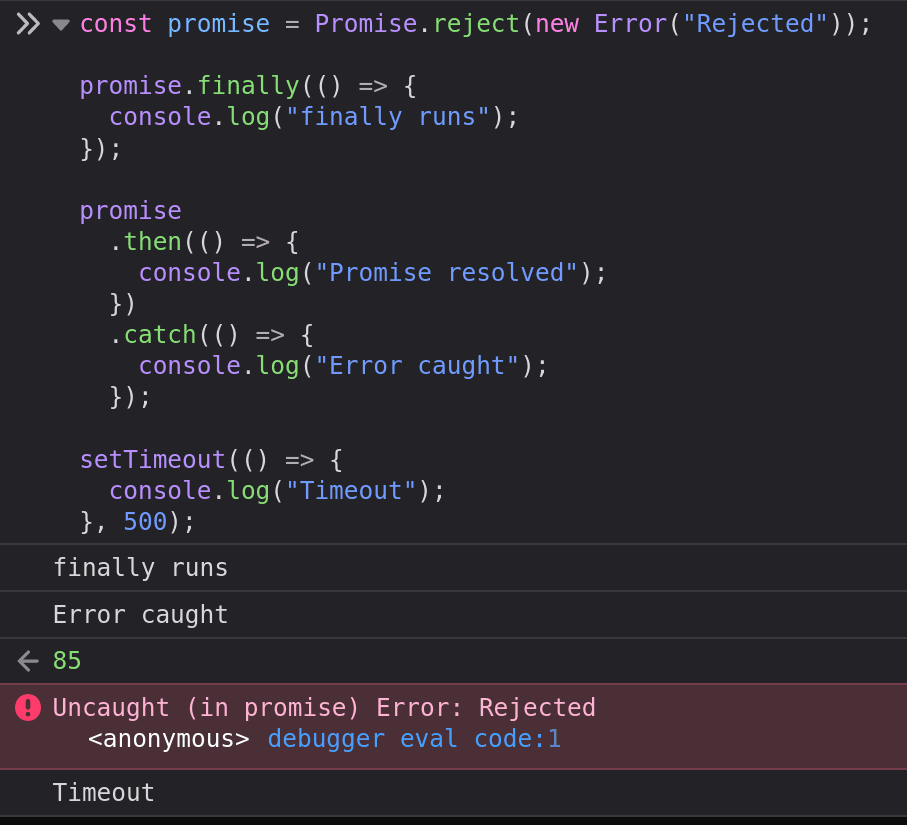Catch rejections in every Promise chain
Consider the following source code:
const promise = Promise.reject(new Error("Rejected"));
promise.finally(() => {
console.log("finally runs");
});
promise.then(
() => {
console.log("Promise resolved");
},
() => {
console.log("Error caught");
},
);
If you run the following code in Node.js, the result will be the following (at least on versions v16.13.1, v16.18.0, and v19.0.0):
$ node test.js
finally runs
Error caught
/home/voreny/projects/blog/test/test.js:1
const promise = Promise.reject(new Error("Rejected"));
^
Error: Rejected
at Object.<anonymous> (/home/voreny/projects/blog/test/test.js:1:32)
at Module._compile (node:internal/modules/cjs/loader:1159:14)
at Module._extensions..js (node:internal/modules/cjs/loader:1213:10)
at Module.load (node:internal/modules/cjs/loader:1037:32)
at Module._load (node:internal/modules/cjs/loader:878:12)
at Function.executeUserEntryPoint [as runMain] (node:internal/modules/run_main:82:12)
at node:internal/main/run_main_module:23:47
I was surprised by this behavior. I thought I caught the rejection by providing
the second callback to then (the one that prints Error caught). Refactoring
the second callback of then to a standalone catch
(promise.then(...).catch(...)) does not help. What surprised me is that in
this case, the process exits, which we can observe by adding a delayed
console.log:
const promise = Promise.reject(new Error("Rejected"));
promise.finally(() => {
console.log("finally runs");
});
promise
.then(() => {
console.log("Promise resolved");
})
.catch(() => {
console.log("Error caught");
});
setTimeout(() => {
console.log("Timeout");
}, 500);
The output is still the same. No sign of Timeout being printed in the console.
The process exits right away:
$ time node test.js
finally runs
Error caught
/home/voreny/projects/blog/test/test.js:1
const promise = Promise.reject(new Error("Rejected"));
^
Error: Rejected
at Object.<anonymous> (/home/voreny/projects/blog/test/test.js:1:32)
at Module._compile (node:internal/modules/cjs/loader:1159:14)
at Module._extensions..js (node:internal/modules/cjs/loader:1213:10)
at Module.load (node:internal/modules/cjs/loader:1037:32)
at Module._load (node:internal/modules/cjs/loader:878:12)
at Function.executeUserEntryPoint [as runMain] (node:internal/modules/run_main:82:12)
at node:internal/main/run_main_module:23:47
Node.js v19.0.0
real 0m0,034s
user 0m0,022s
sys 0m0,013s
Unhandled rejections
What we just observed is how Node.js reacts to unhandled Promise rejections.
When a Promise chain ends with a rejection that was not caught, Node.js emits
the unhandledRejection event.
We can register a handler for that event:
const promise = Promise.reject(new Error("Rejected"));
process.on("unhandledRejection", (error) => {
console.log("Got unhandled rejection", error);
});
setTimeout(() => {
console.log("Timeout");
}, 500);
Just as like
in physics, the
observation alters the outcome. Just because we registered an event handler for
these unhandled rejections, the process no longer exits and Timeout is printed
in the console:
$ time node test.js
Got unhandled rejection Error: Rejected
at Object.<anonymous> (/home/voreny/projects/blog/test/test.js:1:32)
at Module._compile (node:internal/modules/cjs/loader:1159:14)
at Module._extensions..js (node:internal/modules/cjs/loader:1213:10)
at Module.load (node:internal/modules/cjs/loader:1037:32)
at Module._load (node:internal/modules/cjs/loader:878:12)
at Function.executeUserEntryPoint [as runMain] (node:internal/modules/run_main:82:12)
at node:internal/main/run_main_module:23:47
Timeout
real 0m0,532s
user 0m0,032s
sys 0m0,004s
Handling rejections in each Promise chain
Coming back to the example from the beginning of the article, let's attach a
handler for unhandledRejections:
const promise = Promise.reject(new Error("Rejected"));
promise.finally(() => {
console.log("finally runs");
});
promise
.then(() => {
console.log("Promise resolved");
})
.catch(() => {
console.log("Error caught");
});
process.on("unhandledRejection", (error) => {
console.log("Got unhandled rejection", error);
});
$ node test.js
finally runs
Error caught
Got unhandled rejection Error: Rejected
at Object.<anonymous> (/home/voreny/projects/blog/test/test.js:1:32)
at Module._compile (node:internal/modules/cjs/loader:1159:14)
at Module._extensions..js (node:internal/modules/cjs/loader:1213:10)
at Module.load (node:internal/modules/cjs/loader:1037:32)
at Module._load (node:internal/modules/cjs/loader:878:12)
at Function.executeUserEntryPoint [as runMain] (node:internal/modules/run_main:82:12)
at node:internal/main/run_main_module:23:47
This shows exactly that despite having a catch in the second Promise chain,
there is still an unhandled rejection in the first Promise chain (the one with a
sole finally).
Attaching a catch in the first Promise chain makes the unhandled rejection
event go away:
const promise = Promise.reject(new Error("Rejected"));
promise
.finally(() => {
console.log("finally runs");
})
.catch(() => {
console.log("Error also caught in first chain");
});
promise
.then(() => {
console.log("Promise resolved");
})
.catch(() => {
console.log("Error caught");
});
process.on("unhandledRejection", (error) => {
console.log("Got unhandled rejection", error);
});
$ node test.js
finally runs
Error caught
Error also caught in first chain
Real-life example
I encountered this behavior when trying to mix Promises and
Node.js Streams. I
wanted to use the asynchronous version of
pipeline
and remove event listeners at the end of the pipeline, regardless of whether it
was successful or not. The code looked like this:
const pipelineWithoutDestroyingSource = (
sourceStream: Readable,
transforms: Transform[],
) => {
const newSource = new Duplex();
sourceStream.pipe(newSource);
const pipelinePromise = pipeline(newSource, ...transforms);
pipelinePromise.finally(() => {
sourceStream.unpipe(newSource);
});
return pipelinePromise;
};
// in some other place
try {
await pipelineWithoutDestroyingSource(/* ... */);
} catch (error) {
console.log("Could not complete the pipeline", error);
}
Note that this code is missing error handling and may not work. It is just to show the use of promises.
This snippet creates a new Promise chain that does not have any rejection
handlers. Even though the rejection is caught in the try block, this is just
the rejection in one Promise chain. The other Promise chain inside of
pipelineWithoutDestroyingSource is still there and will trigger
unhandledRejection events. This will end up exiting the process.
Unhandled rejections in the browser
Unhandled rejections behave the same way in the browser. If we take the code from the beginning of the article and run it in Chrome or Firefox (these are the browsers I checked), we get an error log about an Uncaught (in promise) Error.
It is not as destructive as in Node.js and an unhandled rejection does not kill the browser tab. Registered timeouts and other asynchronous events continue to run:
const promise = Promise.reject(new Error("Rejected"));
promise.finally(() => {
console.log("finally runs");
});
promise
.then(() => {
console.log("Promise resolved");
})
.catch(() => {
console.log("Error caught");
});
setTimeout(() => {
console.log("Timeout");
}, 500);

Summary
The requirement to handle rejections in every Promise chain seems to hold up in
the browser and Node.js. The former leaves extra information in the console but
seems otherwise harmless. The latter leads to the process being killed
unexpectedly, unless a handler for unhandledRejection events is registered.
Catching the rejection once, in one Promise chain, does not mean that the
rejection is handled in other chains. The rejection must be handled in each
Promise chain (.then, .finally) to consdier it handled.
The safe thing to do is to always .catch errors before a .finally when the
intention is to do some cleanup regardless of the process resolution.